Foundation for Rural & Regional Renewal (FRRR)
More than $120,000 awarded to local not-for-profits
FRRR and Gardiner Foundation have awarded $124,478 to 27 community groups across Gippsland, South Western and Northern Victoria for local initiatives that will support, strengthen and sustain their dairying regions.
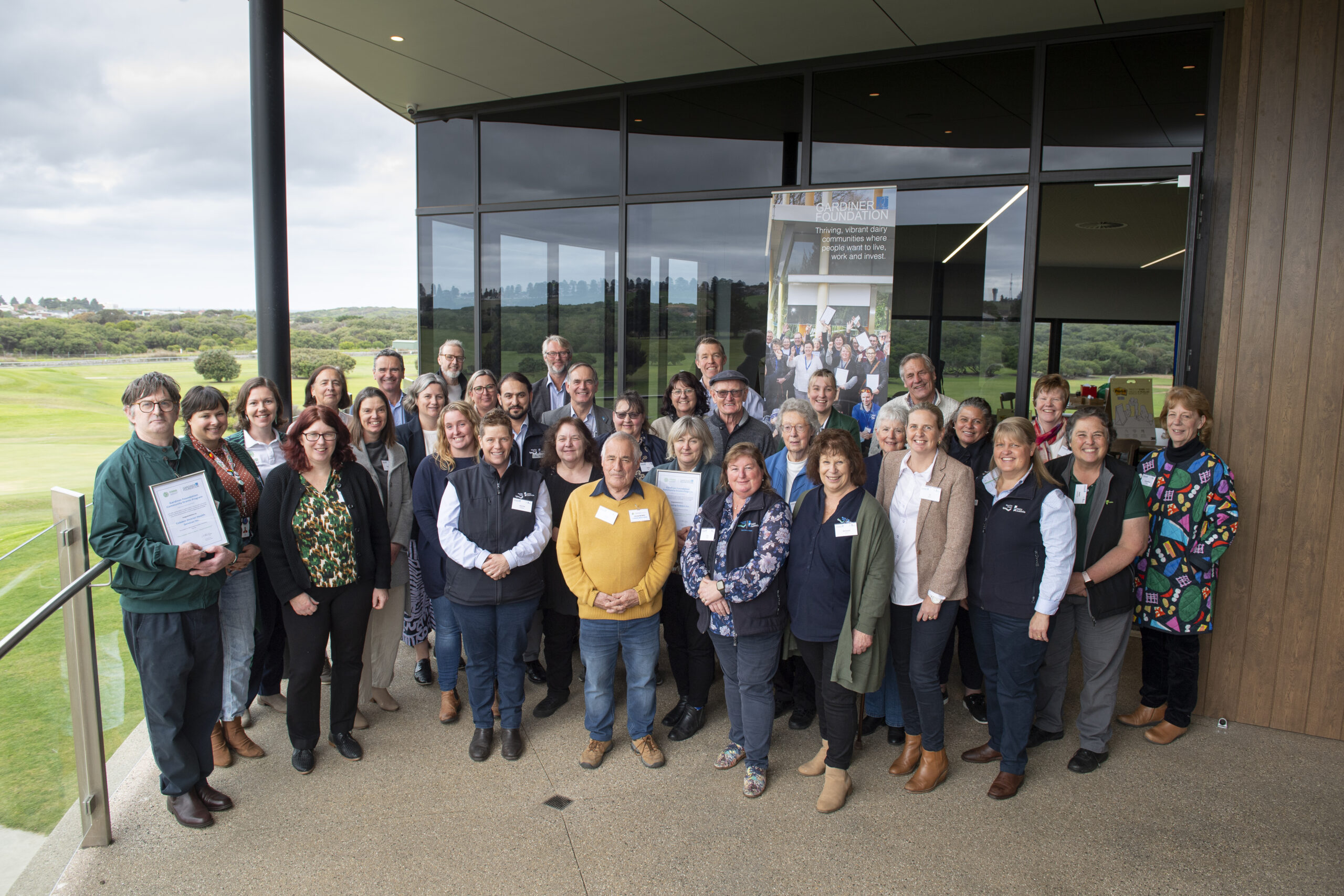
For 22 years, the Gardiner Foundation Community Grants program has empowered not-for-profit organisations in Victoria’s dairy communities to create and lead projects that help locals to connect and support their farming regions to be sustainable and vibrant places to live and work.
This year, Victoria’s dairying regions will be boosted by a wide range of community-led projects including:
Allan Cameron, Gardiner Foundation CEO, said that the organisation’s longstanding partnership with FRRR has enabled it to invest more than $2.4 million in Victoria’s dairying regions.
“The Community Grants Program aims to support purpose-driven, not-for-profit organisations in rural and regional Victoria by enhancing their capacity to serve their local communities effectively.
“Since the program began in 2003, we have supported over 600 projects across the state. These grants provide crucial financial support to community groups, helping them overcome challenges as they work to revitalise their communities.
“We take pride in recognising the remarkable efforts of these groups within their communities, often carried out voluntarily, and in assisting them by funding projects that they believe will significantly enhance community resilience,” Mr Cameron said.
Jill Karena, FRRR Place Portfolio Lead, said that the impact that the Gardiner Foundation Community Grants program has had over the past 22 years is a testament to what is possible through collaboration with partners like Gardiner Foundation.
“Not-for-profits work tirelessly to strengthen and grow the social and cultural fabric of their communities. But with the current economic landscape and climate-related transitions impacting Victoria, keeping these organisations up and running is becoming exceedingly difficult. Therefore, it’s not surprising that this year we saw a predominant need from community groups for funding to develop organisational resilience and capacity.
“Victoria’s dairy regions are resilient and resourceful, and we have seen, firsthand, the transformational change and outcomes that local people can achieve when they have access to funding.
“We are proud to play a small role in enabling these groups to drive change, build connections and share the vibrancy and determination of those living in Victoria’s dairying regions,” Ms Karena said.
The full list of grant recipients and their projects are below.
| Organisation | Project | Location | Grant | |||
|---|---|---|---|---|---|---|
GIPPSLAND | ||||||
| A Better Life for Foster Kids Inc | Crisis Cases for Emergency Foster Care Improving community health and social wellbeing via the provision of Crisis Cases to support the transition of children into foster home emergency care in the Sale area. | Sale | $4,960 | |||
| Baw Baw Shire Council | Tables and Chairs for the Social Club Room Build community resilience through improvements to a meeting place that is used by local groups to improve social connectedness in Ellinbank and the surrounding region. | Ellinbank | $4,800 | |||
| Bruthen and District Citizens Association Inc | Community Grow Swap Learn Program & Workshops Build community resilience through purchasing equipment and running workshops that increase capability and capacity for local community gardening and increase participation and learning to improve community health and wellbeing. | Bruthen | $5,000 | |||
| Fabelo Inc on behalf of Fishy Stories | Fishy Stories Improving community health and social wellbeing by contributing to young children's learning activities at a local festival. | Fish Creek | $5,000 | |||
| Fish Creek Football Netball Club Inc | Recipes for Recovery Cookbook Build community resilience by recording the stories of the families within our community through food, producing a functional recipe book that will be treasured by generations to come and support local fundraising. | Fish Creek | $5,000 | |||
| Friends of Coal Creek Inc | Digitisation of the Historical Assets of Coal Creek Build organisational capacity to preserve historical items through digitisation, which will support tourism and enhance local identity and pride. | Korumburra | $5,000 | |||
| Heyfield War Memorial Hall Committee of Management Inc | Upgrade Kitchen Cupboards Improve community infrastructure with new kitchen drawers to increase utility for senior and disabled community members at the Heyfield War Memorial Hall. | Heyfield | $3,300 | |||
| Hillview Bunyip Aged Care Inc | Community Kitchen Project Build community resilience through installing a kitchen to provide a facility for local catering and programs to address food insecurity in Bunyip and surrounding communities. | Bunyip | $5,000 | |||
| Labertouche and District Men's Shed | Upgrade Wood-splitter to Electric Start Motor Build organisational capacity by installing an electric start motor on the wood-splitter that enables the local Men's Shed to contribute services of land clearing, firewood collection and woodworking to the Labertouche community. | Labertouche | $3,578 | |||
| Treble F Singers Inc | Training and Administration Aids Build organisational capability through purchasing audiovisual equipment and a laptop to improve operations and administration for the local choir, supporting local opportunities for participation and performances to support community activity. | Leongatha | $2,907 | |||
| Venus Bay Tarwin Lower and District Men's Shed Inc | Festival FREE Fun for Kids Build community resilience and a stronger economy through providing free activities for children and entertainment for locals and tourists to support attendance of the 2024 Tarwin District Community Show. | Tarwin | $5,000 | |||
| NORTHERN VICTORIA | ||||||
| Gargarro Botanic Garden Ltd on behalf of Friends of Gargarro & Nursery | Growing More Than Plants Build community resilience through extending a community-run nursery to support volunteers, grow plants for the local botanic garden, and support the community organisation's financial sustainability. | Girgarre | $5,000 | |||
| Greta Valley Landcare Group | Moyhu Walking Track Landscaping Project Enhance community infrastructure by establishing a safe and educational pathway for accessing the King River from Moyhu to support both residents and visitor enjoyment of, and connection to, the local environment. | Moyhu | $5,000 | |||
| Gundowring Recreation and Hall Reserve Committee of Management | The Gundowring Hall in the 21st Century: Warm in Winter, Cool in Summer Improve community infrastructure with a split system air conditioner installed at Gundowring Hall to support increased community meetings, craft and wellbeing activities. | Gundowring | $4,752 | |||
| Lions Club of Upper Kiewa Valley Inc on behalf of Kiewa Valley Community Garden | Sprout & Stow - Kiewa Valley's Garden Gear Garage Enhance community facilities with a lock up container installed to store and maintain gardening equipment for all the users and visitors to the Kiewa Valley Community Garden. | Tangambalanga | $5,000 | |||
| Lockington District Business Centre Inc | Locky Ukers Project Build community resilience and cultural vibrancy in Lockington with musical gear to support the Locky Ukers in their community ukele practice and performance, ensuring inclusive participation and improvement. | Lockington | $2,129 | |||
| Murrabit Advancement Association Inc | Murrabit - Keeping Up With the News! Improve capability of organisation by purchasing a new photocopier to support local information distribution, including a monthly community newsletter that enables connection, enhances the services volunteers provide to community, and promotes local activity for greater participation and economic strength. | Murrabit | $5,000 | |||
| NCN Health | Chills Skills Across the Community - Supporting the Mental Wellbeing of Children in Moira Shire Build the resilience of primary school children through implementing a mental health program with local facilitators trained in an evidence-based program and supported to develop an ongoing community of practice. | Cobram | $5,000 | |||
| North East Regional Pre-School Association Inc on behalf of Whorouly and District Preschool | A Water Garden for Whorouly Kindergarten Increase the capacity for learning through play with the installation of a water play area with shade sail at Whorouly Kindergarten, supporting educational and social development of current and future preschoolers and children attending playgroup. | Whorouly | $5,000 | |||
| SOUTH WESTERN VICTORIA | ||||||
| A is for Atlas Limited | Dining Room Tales X Keayang Maar 2024 Build community resilience through delivering unique international artist experiences to enable rural communities access to global learning experiences for social resilience, and enable tourism opportunity. | Dixie | $4,419 | |||
| Anam Cara House Colac Inc | Renewable Rays for Respite - Sustainable End-of-Life Care Through Solar Energy Improve organisational infrastructure with a solar panel system that will reduce operational costs and allow for savings to increase care services. | Colac | $4,537 | |||
| Beech Forest & District Progress Association Inc | Strengthening Community Through Rebuild of the Old Beech Forest Bakery Oven Build community resilience and foster connection through installing seating and steel benches to complement the re-build of old Beech Forest bakery oven to benefit the community with staple food access and increasing economic and educational opportunities to build a more inclusive, sustainable future. | Beech Forest | $4,975 | |||
| Cobden District Health Services Inc on behalf of Cobden Men's Shed | The Cobden Men’s Shed – Shed Extension Build community resilience with an extension to expand Cobden's Men's Shed facility and increase the capacity for participation and activity that supports mental health and social wellbeing. | Cobden | $5,000 | |||
| Coragulac & District Kindergarten Inc | Skylights and Ventilation Increase the capacity for learning through installation of skylights and ventilation at Coragulac & District Kindergarten, supporting educational and social development of current and future pre-schoolers. | Coragulac | $5,000 | |||
| Progressing Cobden Inc on behalf of Cobden & District Historical Society | Equipment to Enable Cataloguing, Labelling and Storage of Collected History Build community organisational capacity by upgrading the equipment of the local historical society to enable digital cataloguing and conservation that will preserve local identity and support research on local and family history. | Cobden | $4,121 | |||
| Terang & District Progress Association | Activities at Colour Terang Festival 2024 Foster community vibrancy and social connection via free activities for children at the Terang Colour Festival, to enable affordable participation for the whole community. | Terang | $5,000 | |||
| United Way Glenelg Victoria Incorporated | Imagination Bush Library Increase the capacity for learning and social development by providing children with books to build their literacy skills and love of reading. | Dartmoor | $5,000 | |||
Jaithmathang TABOO is an Indigenous organisation working on Country in North East Victoria to support regeneration in the landscape’s recovery following the 2019/20 bushfires, and to support cultural healing.
They were awarded a $120,000 grant in April 2022 (to be paid over three years) from FRRR through the Bushfire Recovery Fund, which is supported by the Helen Macpherson Smith Trust and the Sidney Myer Fund. The funding was for a program of annual cool burns and to work with key environment and government stakeholders to share learnings.
The project, titled ‘Beginning the journey to cultural healing on Jaithmathang Country’, specifically aimed to build the capacity of the organisation by contributing to the cost of employing a Jaithmathang descendant for three years to project manage the cool burning program in the Falls Creek region. It also aimed to help in establishing ongoing partnerships and engagement with key stakeholder organisations that can support Jaithmathang to operate sustainably into the future as custodians on Country.
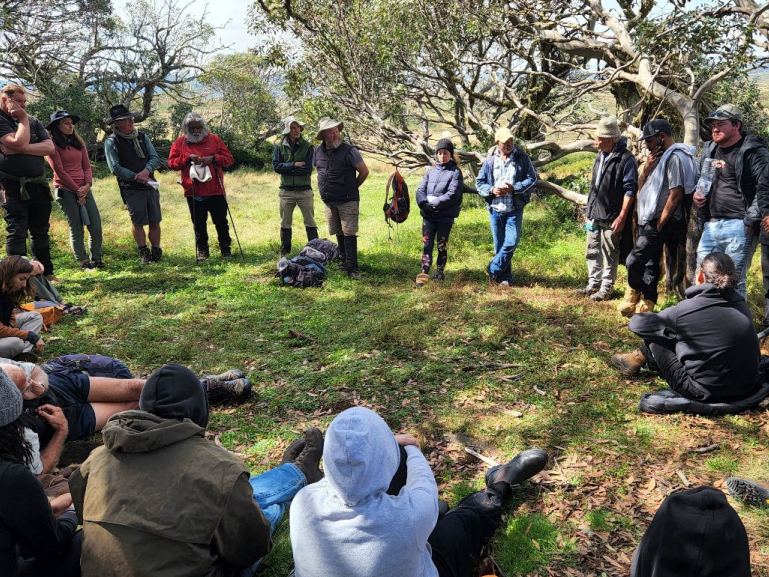
The organisation recently submitted an interim report about what they did in the first year of funding. FRRR’s Program Manager, Danielle Griffin, says the group should be really proud of what they’ve achieved in the first year.
“In year one, Jaithmathang has successfully engaged with the targeted government, First Nations and subject matter expert stakeholders to support their foundational return to Jaithmathang Country. As the Jaithmathang Elders belong to the stolen generation and were removed from Country, it is a privilege to be involved in this significant work to build their capacity for returning to Country and participate in local recovery through disaster management and the intrinsic healing practices that will support Indigenous land and people. The tripartite partnership is a great outcome for year one of this grant,” she said.
The following is an extract from the report, which provides more detail on the background and the partnerships created to date.
The countryside of Bimble is our age-old family tree and it reflects in its rich and diverse lands, the history and heritage of the Jaithmathang Original Peoples. It is our most ancient landscape and it is beautiful and life giving. Mung, Tyer and Buller and all creatures and living things created by Bunjilla are respected and form part of the interconnected ecosystem where each is essential to one another. Our women, men and children are connected through birth right to our Bunjilla Dreaming Bimble, where we reconnect with our spiritual origins and renew our sense of belonging and meaning.
Cultural burning, or the use of fire as a tool for managing landscapes, was an intrinsic part of the connection to country for many Indigenous cultures. Cultural burning is a deeply cultural and spiritual practice that played an important role in the relationship between Indigenous people and our land. It was a tool for managing the land, communicating with the spirits, and maintaining a strong connection to country.
Despite the worsening severity of bushfire activity in Australia, the recognition and adoption of meaningful cultural cool burning as part of a defensive strategy is still in its infancy in current land management practices. We have developed strong partnerships with private landholders and government to achieve the access, consent and participation from all stakeholders required to build an effective approach to fire management, underpinned by traditional knowledge and practices. However, resistance to the introduction of more traditional fire management practice is problematic and will require ongoing work, coordination and support.
Jaithmathang TABOO, Nallawilli Bunjil and CSIRO have creating a tripartite working group to reintroduce traditional cultural burning practices and Indigenous fire knowledge into modern fire management. Nallawilli Bunjil is a commercial drone surveillance and data modelling organisation led by Jaithmathang Elder Roderick McCleod, which provides expertise in virtual modelling to capture real time data about a landscape, including temperature, weather conditions, and for the purposes of fire management, fuel hazard. All parties aim to enhance the health of the land and its Indigenous people.
The outlined project supports developing Monitoring, Evaluation and Research (MER), contributing directly to the Victorian Traditional Owner Cultural Fire Strategy. Jaithmathang TABOO has agreed to work closely with neighbouring nations, including Gunaikurnai Land and Water Aboriginal Corporation. The project will coordinate with the Department of Environment, Energy Climate Action, Federation of Victorian Traditional Owner Corporation, Country Fire Authority and Parks Victoria as priority stakeholders of the project.
CSIRO has developed a bushfire model called Spark, an end-to-end interactive 3D processing tool to predict fire behaviour, based on existing fire spread models. The system has been developed with the capability to be customised for use in risk management, planning, fire spread, research, prescribe burns and fire response.
Spark ingests fuel availability, load, topography and gridded weather based on an ignition point or ignition pattern. It then simulates the temporal and spatial extent of the fire, providing mitigation and contaminate strategies for ongoing bushfires. The project will pilot MER to help start building an accurate cultural burn model for eucalypt forests, undertaking fundamental field observations pre, during and post, documenting on country and operational cool burning methodology.
In reducing the occurrence, intensity and severity of wildfires, cultural burning has an array of interconnected objectives. These include cultural asset protection, habitat protection, biodiversity recovery, fuel reduction, waterway restoration and bush regeneration.
The important role that cultural burning can play in healing and improving the long-term health of country is increasingly being understood, and resources that support cultural burning such as the Traditional Owner Cultural Fire Strategy, support the expansion of cultural burning in Victoria.
The third phase will be to plan and conduct Cultural mosaic burns within the pilot area, sampling major vegetation, typography, weather /moisture and escape risk assessment. A project report will be compiled by CSIRO comparing cultural cool burn management to standard practices today, outlining the potential benefits of Indigenous Fire Practitioners.
FRRR and Gardiner Foundation offer grants up to $5,000 to local not-for-profits
Community groups in small dairy communities across Gippsland, South-West and Northern Victoria can now apply for Gardiner Foundation Community Grants up to $5,000 to strengthen and build capacity in their dairying region.
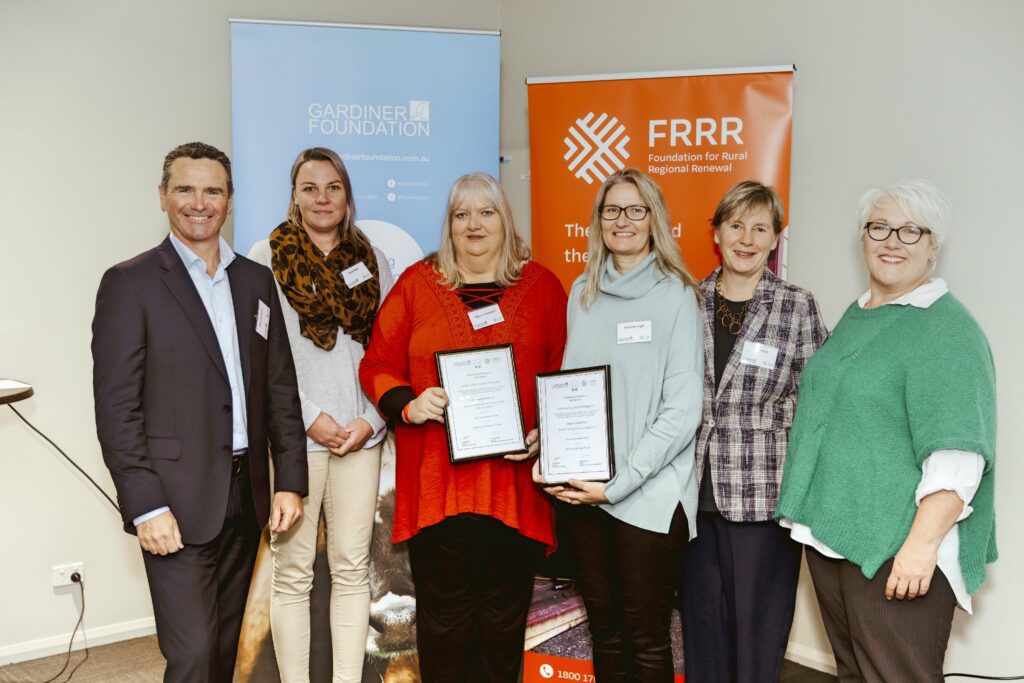
Over the last 22 years, FRRR and Gardiner Foundation have granted more than $2.2 million to 560 projects that have helped these farming communities to be more connected, sustainable, and vibrant places to live and work.
This year, the Gardiner Foundation Community Grants Program is offering grants totalling $120,000 to not-for-profit organisations (NFPs) for a broad range of projects that help their dairying communities to thrive.
Allan Cameron, Gardiner Foundation CEO, said that the Foundation is committed to continuing to invest in the local groups that are working to enhance the liveability of small Victorian towns reliant on the dairy industry.
“We know that year in, year out, community volunteers are committed to the work of local community groups which meet local challenges and create opportunities to strengthen the fabric of their communities.” Mr Cameron said.
Historically, the community grants have funded a diverse range of projects, including initiatives that support education and training, health and social wellbeing or the amenity of a public setting.
Last year’s Community Grants Program provides some examples of the range of initiatives that are funded. In Leongatha, the local Men’s Shed, which hosts a range of community groups, including the local choir, received funds for an air conditioner. In Gellibrand, the local Hall Committee received a grant to buy new chairs to improve the amenity and safety of the community’s meeting space. Warrnambool College and Grasmere Primary School received a grant to establish an Indigenous sensory garden, which has provided students with hands on experience to enhance their educational outcomes.
“I look forward to seeing the impact that is delivered from this year’s grants,” Mr Cameron said.
Natalie Egleton, CEO of FRRR, said it’s wonderful to have partners, like Gardiner Foundation, that understand the impact that small grants can have on rural places.
“We know from past recipients that these grants have enabled communities to achieve more than they would otherwise. Groups also tell us how it can often be a catalyst for further funding. This reaffirms the importance of this program, and it shows that with just a small amount of seed funding, communities can build resilience and thrive.
“I encourage community groups to take advantage of these grants and consider how they can leverage the funds, so that they have the capacity to inspire, engage and strengthen their dairy communities,” Ms Egleton said.
Applications for the Gardiner Foundation Community Grants Program close 21 March 2024 at 5 pm AEDT.
An online grantseeker workshop will be held Monday, 19 February 2024 from 2-3pm AEDT.
For more information about the grants, or to register for the grantseeker workshop, please visit the Gardiner Foundation Community Grants Program webpage.
FRRR is once again inviting community groups in and around Minyip to apply for funding for community projects that will benefit the township, district and its people.
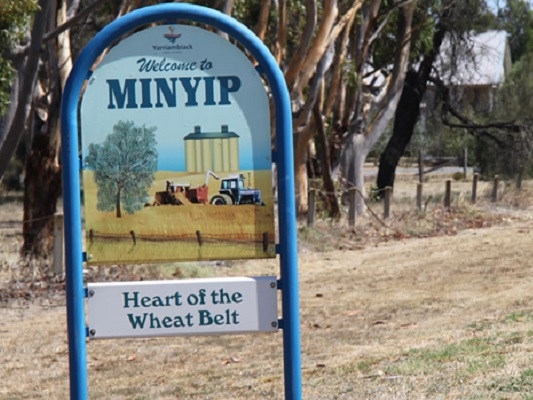
Thanks to the support of the WC and EV Kelm Trust and the PF Pipkorn Trust (managed by Perpetual), FRRR is again offering grants up to $10,000 for projects that address the Minyip community prioritises and that directly and clearly benefit the local region.
Jill Karena, FRRR’s Place Portfolio Lead, said the Foundation is looking forward to hearing from local not-for-profit community groups about what they’d like to do with the funding this year.
“Last year the Minyip Progress Association Inc received funding to repair the west wall of the iconic community-owned Emma’s Building, which had salt damage, putting it at risk of subsiding. The wall forms part of Guy’s Coffee Café, where local residents, tourists and workers meet for a coffee or to buy food. The library is also housed in this building, so both provide essential services to the residents of Minyip and district.
“Halls and facilities in small townships and rural areas are an important meeting place for local people. Ensuring these places are comfortable and accessible for locals to gather, in good times and in difficult times, such as when they may be needed as a heat or bushfire refuge, is just one example of how FRRR can help rural communities, like Minyip, to stay connected and vibrant.”
“We look forward to seeing what project ideas the community puts forward to make Minyip a stronger and more sustainable place to live, work and play,” said Ms Karena.
Since 2021, this funding has been offered through FRRR’s Strengthening Rural Communities grants program (SRC), which in 2023, delivered more than $7 million for 570 projects across remote, rural and regional Australia. In addition to these grants for Minyip, the collaboratively funded SRC program delivers grants to not-for-profit organisations and community groups in remote, rural and regional communities across Australia to address a range of diverse needs, including fostering community connectedness and wellbeing, as well as supporting ongoing disaster recovery and preparedness.
Applicants should visit www.frrr.org.au/src-small-vital for more information and to access the application form. The current round of the SRC program closes on 26 February 2024 at 5pm AEDT. Anyone wanting to know more about the funding should explore the website or give FRRR a call on 1800 170 020.
Originally a resting place for passing drovers, Foster is a small town just north of the Gippsland coast. Like much of regional Victoria, Foster was hit hard by COVID, with long-lasting economic, health and social outcomes. Impacts on social connection, the need to provide food relief for the community, and the reduced ability for community groups to fundraise were all felt strongly by the volunteers at Manna Community Garden.
Established 22 years ago, Manna Community Garden strives to improve food security and social wellbeing in the community. Working closely with Manna Gum Community House, community lunches are held and meals are provided for people in need of support. Demand for these lunches and meals was heightened during the pandemic and continues today, with the need exacerbated by escalating cost-of-living pressures. The two organisations also work together to provide assistance and information via workshops on topics such as grafting and seed saving, and a community stall at the local farmers’ market.
The fire pit in the gardens is an important gathering place for community members. The facility hosts the local youth group, community lunches, evenings in the garden events and NAIDOC week activities.
Before the pandemic, fundraising efforts were underway to pay for desperately needed upgrades to the Manna Community Garden, including to the garden beds and the amenities around the fire pit. A large Christmas in July fundraiser had to be cancelled two days before it was due to be held due to lockdown orders and while local sponsorship allowed the garden upgrades to go ahead, the works around the fire pit remained unfunded. The seating was dangerous and needed replacing if the gardens were to continue to provide an important social space for the community.
The volunteers at Manna Community Garden applied for an FRRR grant to supplement their fundraising strategy and allow them to continue with these much-needed works. Through an Australian Government-funded SRC Rebuilding Regional Communities grant for $2,600, the fire pit seating was able to be upgraded. The community of Foster is now able to safely enjoy the gardens as a space to socialise, come together, learn and provide food relief for the town.
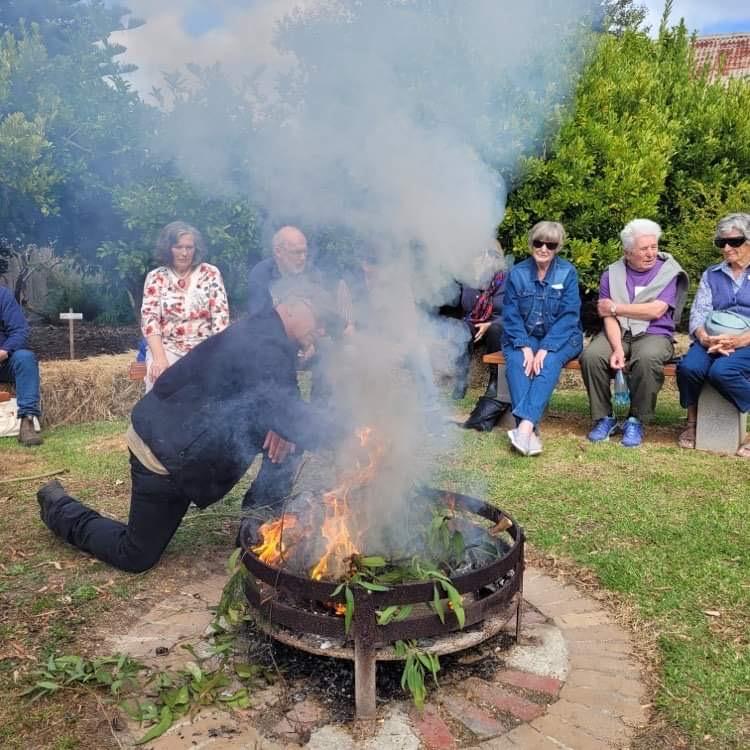

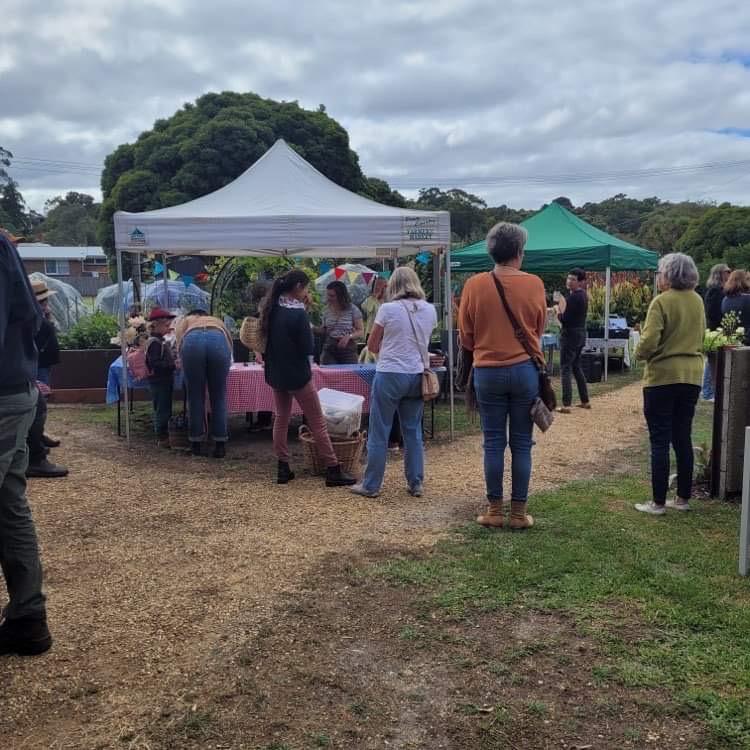
President of Manna Community Garden, Ms Juneen Schulz, explained the importance of the garden upgrades for reconnection:
“The space has provided a beautiful location for members of our community, especially our garden group, to connect. This is particularly important in the recovery from COVID-19, as it gives us a safe space to be together and rebuild our community.”
With the easing of COVID restrictions, Manna Community Garden has since joined together with other community gardens in the district to run annual events, bringing the wider South Gippsland and Bass Coast communities together and celebrating the benefits of growing locally. The first event, held in Foster in the newly renovated garden, attracted 60 guests and included workshops, guest speakers, and of course lots of beautiful locally grown produce!
“We wanted an inclusive day where community gardens across our slice of the universe could come together and discuss our favourite topics – growing food, looking after our hamlets and communities, sharing our knowledge.”
The neighbouring town of Meeniyan will host the next event, in what is hoped will be a long-running tradition – supporting communities that were badly impacted by COVID-19 to come together and encourage the health, economic, environmental, and social benefits of growing produce locally.
The work of Manna Community Garden shows that a small project can have a big, and long lasting, impact!
For many remote, rural and regional communities, drought has been impacting families and businesses for years. Even though it is not always covered in mainstream news, those living in certain parts of Australia know all too well what lasting effects drought can have. For many working in the agriculture industry, the thought of current and future drought can be a stressful and frightening prospect with crops and livestock often hit the hardest. However, in each of these communities there is a fighting spirit, often driven by community-led groups and not-for-profits (NFPs) that work hard to support the wider community.
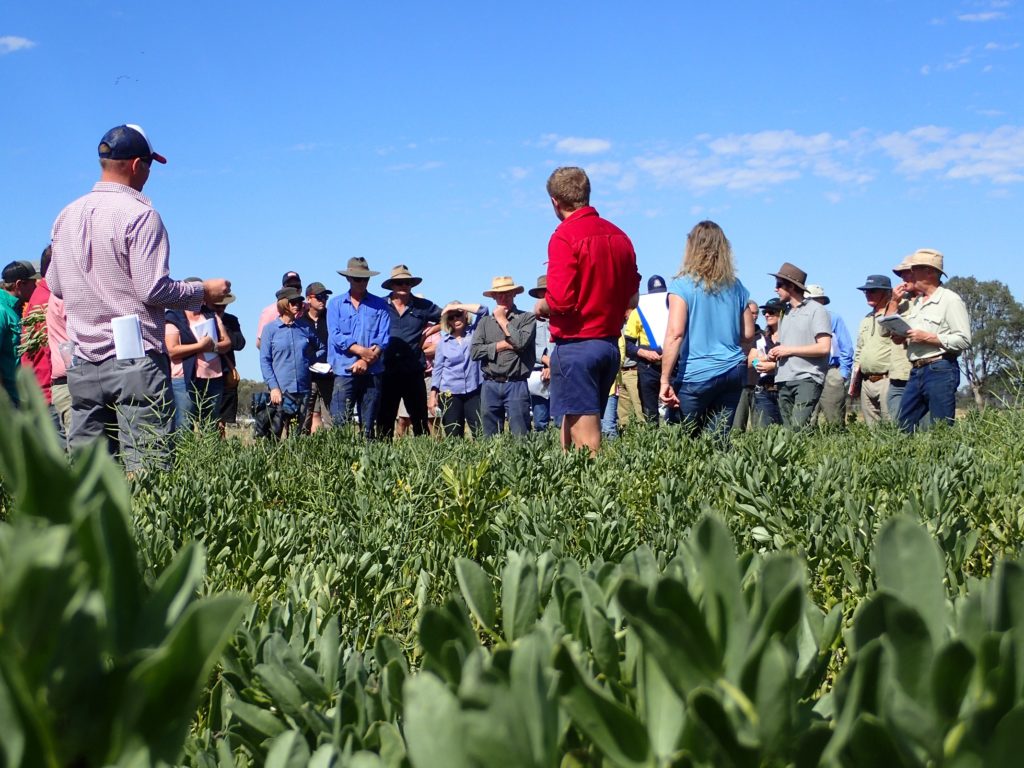
One of these groups is the Gippsland Agricultural Group who are driven by achieving results for farmers in the south east region of Gippsland in Victoria. The organisation is made up of Central and East Gippsland farmers and service providers that have joined forces as people with the shared desire to improve productivity, profitability and sustainability using research, collaboration, product trails and demonstrations to communities in the area.
One example of how Gippsland Agricultural Group planned to achieve this was by holding multiple field days. The Gippsland ‘Connect and Prepare’ field days were designed to build a sense of place and connection for farmers. Research conducted shows that farmers are most comfortable learning from other farmers in informal settings such walking around a paddock talking or learning while doing. For Gippsland Agricultural Group, providing resources like easy access to agricultural service providers, mental health and financial support, as well as strategies and tactics and practical learning, are all key to strengthening preparedness and resilience to future drought events.
Using a $42,920 grant through the Australian Government’s Future Drought Fund Networks to Build Drought Resilience program, Gippsland Agricultural Group held two farmer field days. Both days focused on farmer mental health and wellbeing by bringing health service providers to an environment where farmers are comfortable and feel they will be more likely to engage with services. Each day also featured key staff from other agricultural networks to encourage relationship development, project collaboration and sharing of ideas and resources. The first field day targeted producers, with a focus on networking and connecting with one another and relevant agriculture service providers.
While the field days are a great way to network and increase social interaction, the key purpose of the events is to build knowledge and skills with the estimated 200 producers, 15 agricultural agencies and service providers, and eight agricultural produce-led focus groups.
These events increased participant knowledge and understanding of the risks posed by drought by offering a program that shared information on climate variability. The events carried positive messaging about the resilience of regional producers focusing on practical, implementable drought preparedness solutions for everyday mum and dad farms.
In addition to funding the field days, the grant also enabled the installation of basic toilet facilities at a site frequently used for social and professional networking events. The community now has access to a space that supports educational, social and networking activities in a safe and hygienic space.
Funding helps local preparedness projects get off the ground
Local groups in Korumburra, Myrtleford and Whittlesea township and surrounds, are taking an active approach to preparing their regions for future disaster, thanks to a partnership with FRRR’s Disaster Resilient: Future Ready (DR:FR) Victorian program.
As part of the place-based DR:FR program, the three regional communities are sharing a total of $120,839 in grants. These funds are already being put to use, with communities leading local initiatives designed to improve wellbeing, increase preparedness and strengthen resilience so that each place has greater capacity to endure, adapt and evolve positively when faced with the impacts of climate, disasters and other disruptions.
Nina O’Brien, FRRR’s Disaster Resilience and Recovery Lead, said that FRRR is the DR:FR initiative is an active partnership between FRRR and the communities.
The premise of the DR:FR program is to partner with local groups and community members, and provide them with the tools and resources to identify what their community needs to prepare for the impacts of climate change, natural disasters and broader disruptions.
“The priority projects have been under development since March, so it’s a major milestone to see the local groups getting these important ideas off the ground. We are inspired by the passion and persistence shown by each group and their eagerness to make a difference when the next emergency arrives. “We look forward to continuing to partner with these communities to better prepare their regions to withstand the impacts of future disasters,” Ms O’Brien said.
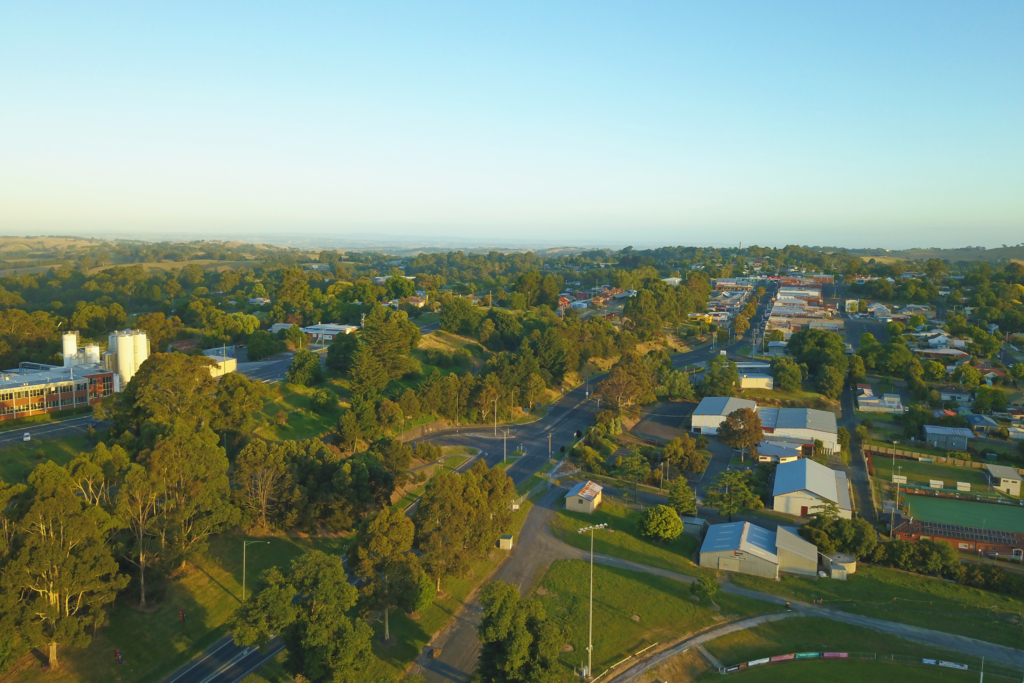 Korumburra, VIC (Image: Tamara Bauer)
Korumburra, VIC (Image: Tamara Bauer)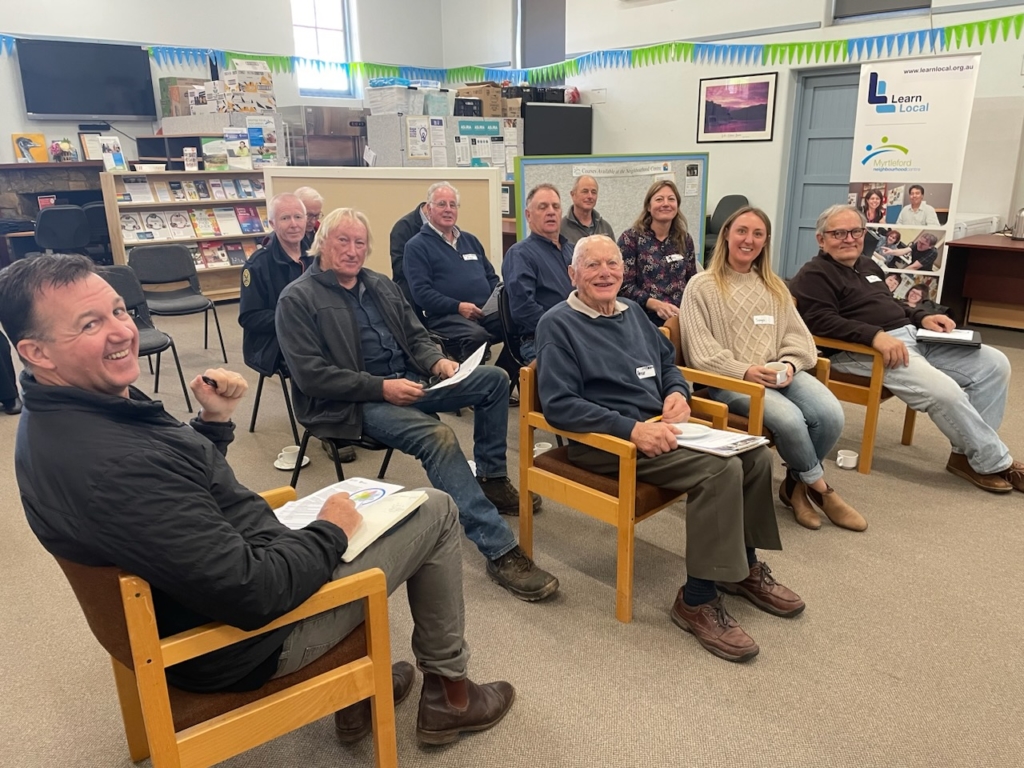 Myrtleford, VIC
Myrtleford, VIC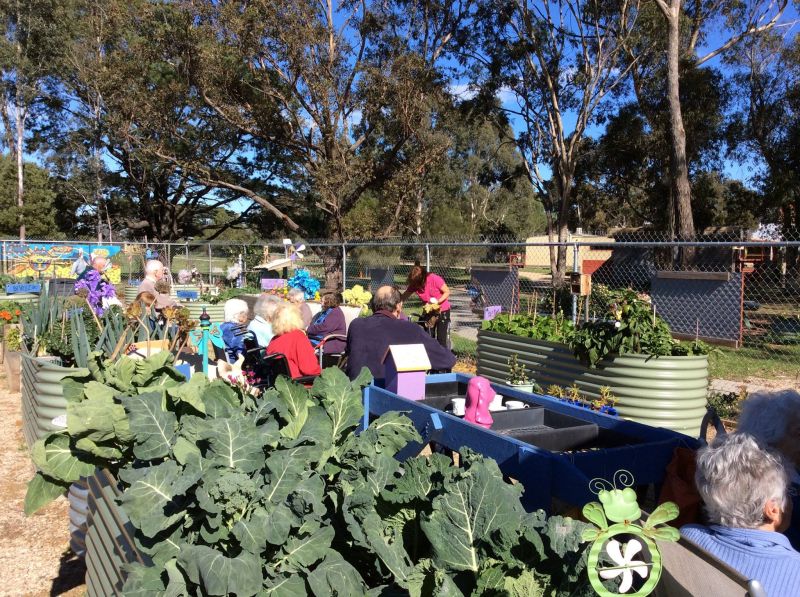 Whittlesea Township & Surrounds, VIC
Whittlesea Township & Surrounds, VIC
Community updates
Korumburra
Korumburra is setting up a Helping Hub, to be run from the local Community House.
The Helping Hub will match community volunteers with those in need of assistance via a website, social media and six-monthly volunteer expos.
The Hub will build community networks and provide connection to residents who need support, improving resilience generally and in emergencies such as storms or heatwaves.
Myrtleford
Mytrleford is fortunate to have a range of community groups and resources that can be mobilised to support the community during a disaster.
FRRR funding has been used to engage a person in a Community Connector Role for the Myrtleford neighbourhood to understand each group’s facilities and resources.
They will continue to work with the groups to plan how they can collectively support residents in the first 72 hours of an emergency event such as flooding or bushfire, and develop a Contacts Directory and Community Assets Map to make communication and co-ordination of resources easier in an emergency.
Whittlesea Township and Surrounds
Whittlesea Township and Surrounds’ Community Resilience Committee (CRC) is using their grant to employ a project officer to support a range of initiatives.
The CRC is keen to ensure that grassroots community action in future events is recognised in the formal Municipal Emergency Management Plan (MEMP) and, therefore, by the formal disaster response agencies. They have received support from the MEMP Committee and are currently rewriting a previous Community Emergency Management Plan, to be endorsed later in 2023.
A key project for this group is to set up a Community Emergency Response Network (CERN) of local residents and community organisations. For future large fires and storms, the CERN would be recognised as part of the formal emergency response and would coordinate the local community-level relief efforts.
The DR:FR initiative is collaboratively supported by many generous donors, who are acknowledged on the FRRR website.
For more information about this program, visit https://frrr.org.au/drfr-victoria/.
Grants round out 14 years of dedicated bushfire recovery funding
FRRR has awarded $207,812 in grants to community groups across the Kinglake Ranges region, for 13 projects that will strengthen the social connectedness and continued recovery of Victorian communities impacted by the 2009 Black Saturday bushfires.
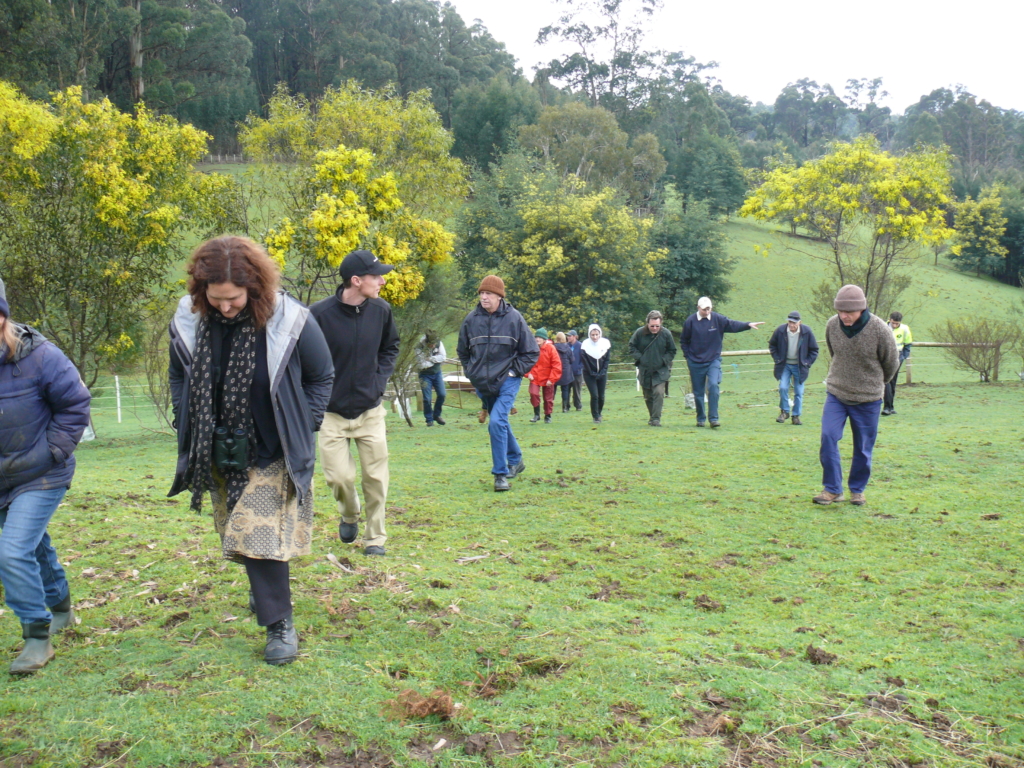
These grants mark the final round of FRRR’s Grants for Resilience & Wellness (GR&W) Kinglake Ranges program and closes out the Victorian Bushfire Appeal Fund (VBAF). In total, VBAF has funded 492 community-led projects, with an investment of $7,436,642, thanks to funds raised by the general public following the bushfires.
In this final round of GR&W Kinglake Ranges grants, locals continue to seek to strengthen community identity and a shared sense of place. Funded projects will create opportunities for people to come together and connect, such as The Foggy Mountain Music and Arts Festival 2023 bush dance, or through improvements made to the accessibility and function of shared spaces like Kinglake Ranges Neighbourhood House’s Community Garden or the Toolangi District Community House’s C J Dennis Hall. Other places, like Flowerdale Community House, are preparing for future disasters by building community capacity through planning and education.
Nina O’Brien, Disaster Resilience & Recovery Lead at FRRR, said the Foundation is humbled to play a small, yet consistent, role in the Kinglake Ranges’ recovery journey.
“For the past 14 years, FRRR’s Grants for Resilience & Wellness program has been dedicated to supporting the recovery of Victorian communities impacted by the historic bushfires. And it’s thanks to the Victorian Bushfire Appeal Fund, and the generosity of everyday people, that we have been able to fund local recovery initiatives, for the long-term.
“Grant programs, like GR&W Kinglake Ranges, demonstrate the complexity of disaster recovery and the need for long-term funding to support affected communities, especially those in remote, rural and regional areas.
“In Kinglake Central, Kinglake West, Pheasant Creek, Toolangi and Flowerdale, we have seen how priorities and needs have shifted and evolved throughout the recovery process. From the initial planning of pathways to further local investment, to training and education to build resilience and foster wellbeing, to small infrastructure projects that provide a safe space for locals to connect and prepare for future disasters.
“We know that the Kinglake Ranges region will continue the process of recovery, and for each community, that will look different. While this is the final round of GR&W, FRRR will continue to support the communities of Kinglake Ranges through our Strengthening Rural Communities grant program.
“It’s important that the people in these communities know that they are supported now, and into the future,” Ms O’Brien explained.
The full list of grant recipients and funded projects are below.
| Organisation | Project | Location | Grant |
|---|---|---|---|
| Flowerdale Community House Inc | Flowerdale Community House into the Future Strengthen a community house’s capacity to deliver emergency response and support community disaster recovery through engaging a facilitator for disaster preparedness planning. | Flowerdale | $25,810 |
| The Flowerdale Sports Club | Connecting the Community Through Physical Wellbeing Rejuvenate a local community hub to strengthen connectedness and support disaster preparedness by improving accessibility and equipment. | Flowerdale | $24,000 |
| Foggy Mountain Inc | Foggy Mountain Music and Arts Festival 2023 Cultivate sense of place and connectedness through holding a community bush dance as part of the 2023 Foggy Mountain Music and Arts Festival. | Kinglake | $3,000 |
| Kinglake Creative Inc | Kinglake Creative Marketing Campaign and Customer Experience Improvements Enhance community connection and economic recovery through a marketing campaign and furnishings to enhance the operations of a creative space. | Kinglake | $8,800 |
| Kinglake Football Netball Club | Nourishing Community Connection in the Ranges Foster community connection and enhance volunteer capacity by upgrading commercial kitchen appliances and equipment at the Kinglake Memorial Reserve. | Kinglake | $19,985 |
| Kinglake Landcare Group (auspiced by Kinglake Ranges Neighbourhood House) | Caring for Your Patch in the Kinglake Ranges - Updating the 2023 Kinglake Landcare Booklet Encourage connection to place and preparedness for future disasters by updating local sustainability and land management resources for Kinglake Ranges residents. | Kinglake | $9,543 |
| Kinglake Ranges Neighbourhood House | Reinvigorating our Community Garden Enhance community connection and opportunities for skill development through accessibility upgrades at a community garden. | Kinglake | $10,736 |
| Kinglake Ranges Neighbourhood House | Supporting Children and Families: Playgroup Building Upgrade Enhance a space for children and parents to participate in playgroup and education activities through minor facility upgrades. | Kinglake | $11,355 |
| Kinglake Ranges Neighbourhood House | Rural Skills for Resilience Boost skills in preparedness and resilience through rural land management and disaster readiness training courses and workshops. | Kinglake | $14,140 |
| Kinglake Trust Reserve Incorporated | Internal Audio-Visual Upgrade Inside the Ellimatta Centre at the Kinglake Trust Reserve Build capacity to host community activities and strengthen community connection through upgrading audio-visual equipment. | Kinglake | $25,000 |
| Murrindindi Youth Foundation (auspiced by The Trustee for the Community Enterprise Charitable Fund) | Delivery of Blue Light Victoria’s School Programs for Students Living in Kinglake Ranges Build social connections, resilience and improve mental health outcomes in young people through school-based leadership and wellbeing programs. | Kinglake | $40,000 |
| Toolangi-Castella Trails Action Group (auspiced by Toolangi District Community House Inc) | Castella Central Park to Tall Trees Trail Toolangi Link Foster community connection and health and wellbeing by engaging a consultant to support planning for an all-weather trail connecting Toolangi and Castella. | Toolangi | $6,864 |
| Toolangi District Community House Inc | Upgrade of CJ Dennis Hall Kitchen and Blinds Foster community connection by enhancing places where people gather through installing a commercial oven at the CJ Dennis Hall and block out blinds at the Toolangi Opportunity Shop. | Toolangi | $8,579 |
By Karly Whelan, Program Manager (VIC/TAS/SA)
Working at FRRR provides many wonderful opportunities to work closely with community. Woor-Dungin’s on-country gatherings are one of these valued opportunities, with Aboriginal Community Controlled Organisations (ACCOs) and philanthropy coming together to develop deeper understanding and stronger relationships. It is a privilege and joy as FRRR’s Victorian Grants Program Manager to attend these annual gatherings.
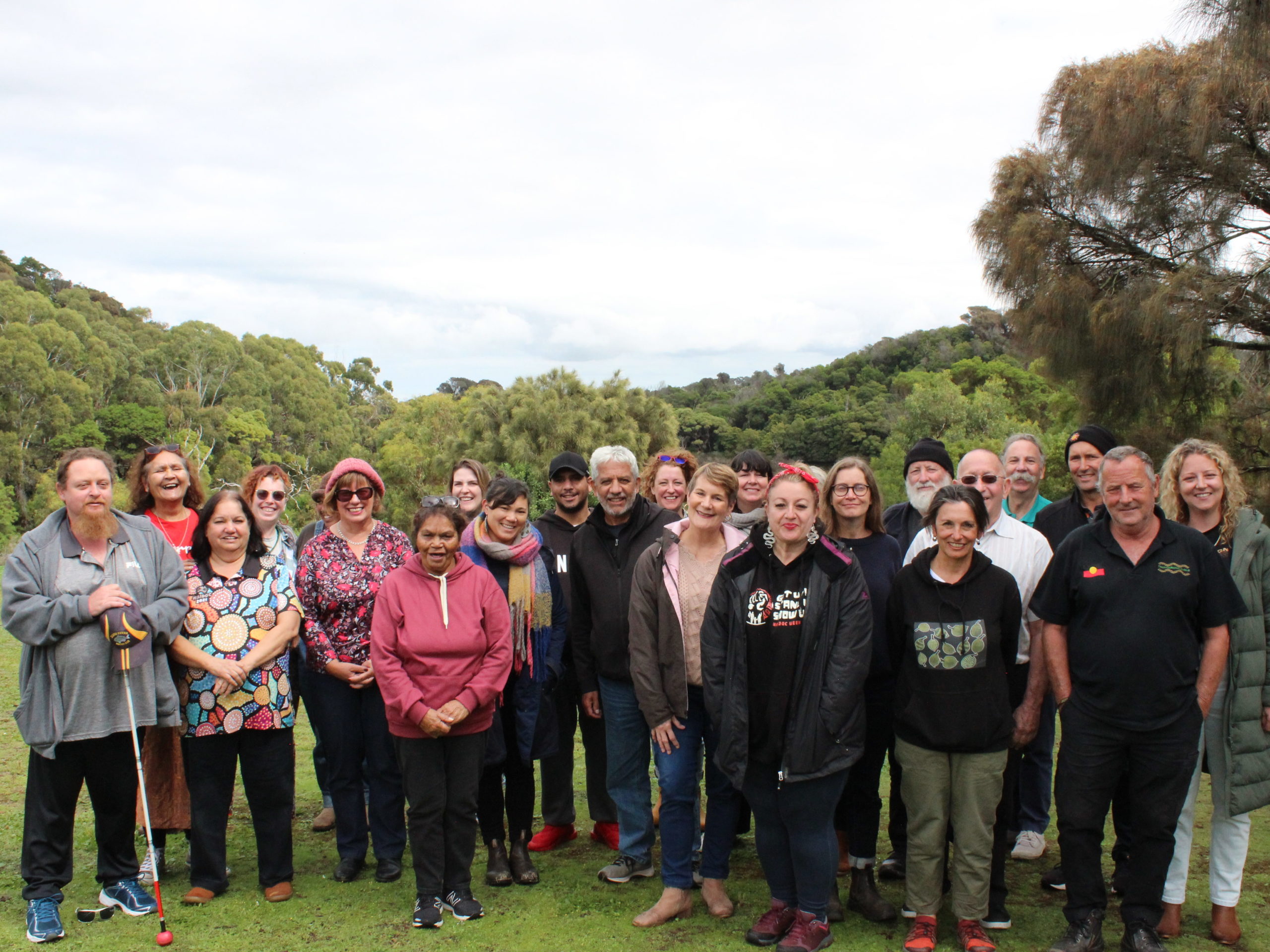
Based in Naarm (Melbourne), Woor-Dungin works with and connects Victorian First Nations groups with resources, pro bono support and philanthropy. Woor-Dungin designed the annual on-country events to support ACCOs with their goals by connecting them in-person with philanthropic organisations.
This year’s gathering took place in late March over three-days on Gunditjmara country in southwest Victoria, where we yarned, enjoyed delicious food, listened, shared insights, and learnt about Gunditjmara culture and country. ACCOs from around Victoria shared their work and impact including developing employment and training programs, deepening understanding of Aboriginal agricultural practices, delivering strength-based health and wellbeing programs, raising awareness and connection to country and culture, creating social enterprises, and artistic endeavours.
It’s not always comfortable – and nor should it be. There is pain and trauma from the ongoing legacy of colonisation and systemic discrimination and injustice. There is also passion and drive, with the gatherings built on the strength and knowledge of First Nations people and organisations.
Philanthropy has a key role to fund gaps, provide resources and create pathways to build capacity and sustain the work of ACCOs. The gatherings provide a space to explore the role of philanthropy in supporting and resourcing First Nations organisations to build capacity, deliver services and programs, and develop innovative projects. It encourages philanthropic organisations to look through the grantseeker’s lens to ensure our programs are responsive, culturally appropriate and accessible for more impactful granting.
I came away invigorated from the gathering, with my head and heart full of meeting new people and reconnecting with others, discussing ways for philanthropy and First Nations groups to forge stronger relationships, and from seeing and listening to the strength and determination of First Nations people. It is a powerful way to learn and share, and to continue developing culturally respectful partnerships built on mutual understanding and trust.
Ourschool connects students and alumni
Ourschool is a not-for-profit organisation that believes past students have a lot to offer current students when it comes to driving equity in education and positive, systemic social impact. In fact, Ourschool’s vision is that every Australian public secondary school has a thriving alumni community whose members are easily able to give back to their old schools. Since 2019, Ourschool has worked with school staff and alumni to inspire and support current students through meaningful engagements in school-based alumni programs.
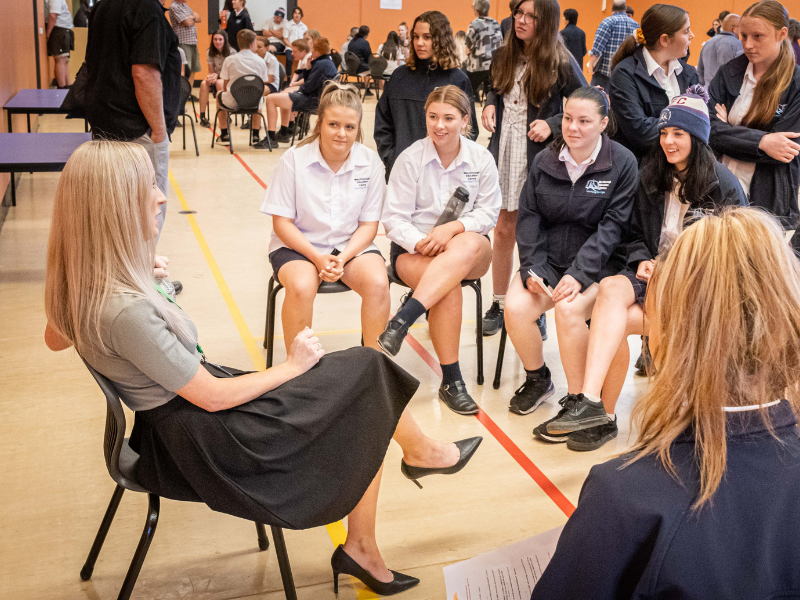
While principals generally see the value of alumni programs, limited funding in public school budgets makes it hard for school principals to invest resources into an alumni program’s establishment and growth. Chronic teacher and education support staff shortages at regional schools (thanks in large part to continued disruptions from COVID and teacher shortages) make it hard to plan alumni sessions and alumni engagement at schools.
But Ourschool is persisting and working hard to make it possible. They partner with FRRR, using a Not-for-Profit Fundraising Account to assist them to fundraise by offering tax deductibility for donations to help them deliver the program in more public secondary schools in rural and regional Victoria.
The funds are used to build program capacity and increase the number of regional schools receiving assistance from Ourschool. And it’s working, with the program operating in 14 regional schools, up from 10 in 2021. This involved employing more staff to deliver the services to the partner schools.
The reach is impressive — during FY22, 7,174 students were involved in 71 alumni career pathways or subject specific sessions, and 110 past students were involved in the sessions across the 14 schools in the Geelong and Ballarat regions alone.
As these alumni programs are “revolutionary” for public high schools, they require small steps, persistence, and a methodical approach to proving the worth of starting such a program. But even valued programs are faced with challenges.
One of Ourschool’s proposed solutions to this problem is the creation of a walkathon prototype school event to mobilise the fundraising capacity of a school’s community and its alumni to help fund and sustain each school’s alumni program. Ourschool is using some of the funds they’ve raised to develop an event resources and operations manual that will be packaged up for the partner schools to use and amend to run a high-quality, annual walkathon or other type of community-school event that raises funds to continue a school’s alumni program.
Check out this post to learn more about what Ourschool’s alumni activities look like.

